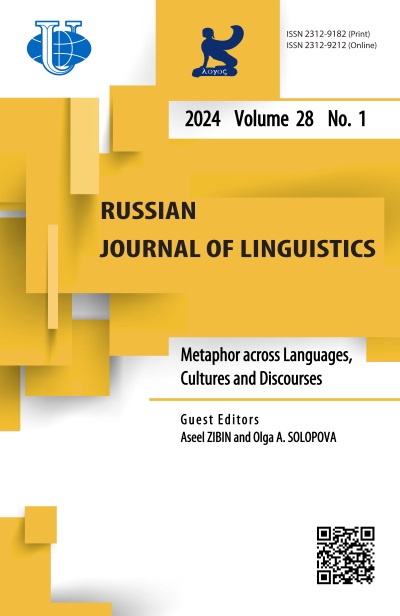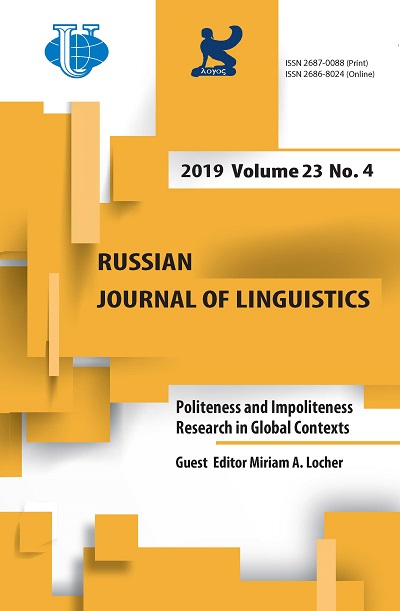Formal and Informal Russian Invitation: Context and Politeness Strategies
- Authors: Vlasyan G.R.1, Kozhukhova I.V.1
-
Affiliations:
- Chelyabinsk State University
- Issue: Vol 23, No 4 (2019): Politeness and Impoliteness Research in Global Contexts
- Pages: 994-1013
- Section: Articles
- URL: https://journals.rudn.ru/linguistics/article/view/22528
- DOI: https://doi.org/10.22363/2687-0088-2019-23-4-994-1013
Cite item
Full Text
Abstract
Invitation is a speech act which is perceived differently across cultures. Understanding the pragmatics of invitation requires knowledge of the notion of politeness and politeness strategies which comprise culture specific elements. Politeness is realized in various discourses, social contexts and speech acts. The purpose of the study is to identify politeness strategies in Russian invitation in formal and informal contexts in three age groups and see how they correspond to the understanding of politeness in Russian communicative culture. The empirical data for the study were obtained through discourse completion tests with 101 participants (issuers of the invitation) of different age and social status as well as through ethnographic observation. The research is based on Discourse Analysis and Politeness Theory (Brown & Levinson 1987; Larina2009, 2015; Locher 2006, 2013; Leech 2014; Mills 2003, 2017; Sifianou 1992; Terkourafi &Kadar 2017; Watts 2003, among others). We used discourse analysis to analyze the impact of the social and cultural context on the performance of invitation, the descriptive method which was used to analyze the pragmatic functions of invitation, as well as contextual interpretation of this speech act and the method of quantitative data processing. The study revealed some differences between a formal and informal invitation concerning politeness strategies and linguistic means of its expression. It also showed that in Russian culture issuing an invitation is not perceived as a face threatening speech act; in the analysed social contexts the preference is given to direct invitation, and the inviter’s imposition, as a rule, is perceived positively. The results contribute to a better understanding of Russian politeness and communicative style and can be implemented in intercultural pragmatics, intercultural communication and SL teaching.
Keywords
About the authors
Gayane Rubenovna Vlasyan
Chelyabinsk State University
Email: VlasyanGR@yandex.ru
PhD in Linguistics, Chair of the Department of Theory and Practice of the English Language at Chelyabinsk State University 129 Brat'yev Kashirinykh st.454001, Chelyabinsk, Russia
Irina Vladimirovna Kozhukhova
Chelyabinsk State University
Email: vinantov@mail.ru
PhD in Linguistics, Associate Professor at Chelyabinsk State University 129 Brat'yev Kashirinykh st.454001, Chelyabinsk, Russia
References
- Акишина А.А., Формановская Н.И. Выражение приглашения в русском языке // Русский язык за рубежом. 1968. № 3. С. 98-107. [Akishina, A.A., Formanovskaya, N.I. (1968). Vyrazhenie priglasheniya v russkomyazyke (Invitations in Russian). Russkij yazyk za rubezhom. № 3. 98-107. (In Russ)].
- Власян Г.Р. Влияние культуры на коммуникативное поведение говорящего // Филологические науки. Вопросы теории и практики. 2016. № 10-1 (64). C. 42-45. [Vlasyan, G.R. (2016). Vlijanie kul’tury na kommunikativnoe povedenie govorjashchego (The impact of culture on communicative behaviour of the speaker). Filologicheskie nauki. Voprosy teorii i praktiki. № 10-1 (64). 42-45. (In Russ)].
- Елизарова Г.В. Особенности национальной культуры: «время» и «пространство» по-русски // Universum: Вестник Герценовского университета. 2009. С. 55-57. [Еlizarova, G.V. (2009) Osobennostinacional'nojkul'tury: “vremya” i “prostranstvo” po-russki (“Time” and “Space” in Russian national culture). Universum: Vestnik Gercenovskogo universiteta. 55-57. (In Russ)].
- Кожухова И.В. Интеррогативные косвенные речевые акты: реализация коммуникативной неимпозитивности (на материале английского и русского языков). Челябинск: ООО «Рекпол». 2012. 144 с. [Kozhuhova, I.V. (2012). Interrogativnye kosvennye rechevye akty: realizaciya kommunikativnoj neimpozitivnosti (na materiale anglijskogo i russkogo yazykov). (Interrogative indirect speech acts: communicative non-imposition (based on English and Russian). Chelyabinsk: OOO “Rekpol”. 144 (In Russ)]
- Кожухова (Винантова) И.В. Структурно-синтаксические закономерности речевого акта «приглашение» в русском языке // Филологические науки. Вопросы теории и практики. 2010. № 3 (7). C. 41-44. [Kozhukhova (Vinantova), I.V. (2010). Strukturno-sintaksicheskie zakonomernosti rechevogo akta “priglashenie” v russkom yazyke (Structural and syntactic peculiarities of invitations in the Russian language). Filologicheskie nauki. Voprosy teorii i praktiki. № 3 (7). 41-44. (In Russ)].
- Ларина Т.В. Прагматика английского приглашения: межкультурный аспект // Жанры речи: Сборник научных статей. Саратов: Издательский центр «Наука», 2009а. Вып. 6. Жанр и язык. С. 307-317. [LarinaT.V. Pragmatika angliiskogo priglasheniya: mezhkul'turnyi aspekt (Pragmatics of English invitation: cross-cultural aspect). Zhanry rechi: Sbornik nauchnykh statei. Saratov: Izdatel'skii tsentr “Nauka”, 2009. Vyp. 6. Zhanr i yazyk. 307-317. [In Russ)].
- Ларина Т.В. Категория вежливости и стиль коммуникации: сопоставление английских и русских лингвокультурных традиций. М.: Языки славянских культур, 2009б. 507 с. [Larina, T.V. (2009) Kategoriya vezhlivosti i stil' kommunikacii: sopostavlenie anglijskih i russkih lingvokul'turnyh tradicij. (Category of Politeness and Communication Style: a Comparison of English and Russian Traditions of Communication) M.: Yazyki slavyanskih kul'tur, 2009. (In Russ)].
- Ларина Т.В. Англичане и русские: Язык, культура, коммуникация. М.: Языки славянских культур, 2013. 360 с. [Larina, T.V. (2013) Anglichane i russkie: Jazyk, kul'tura, kommunikacija. (The English and the Russians: Language, Culture, and Communication) Moscow: Yazyki slavyanskih kul'tur (In Russ)].
- Ларина Т.В., Щелчкова Е.Б. Речевой акт приглашение и проблемы понимания: межкультурный аспект // Вестник Новосибирского государственного университета. Серия: Лингвистика и межкультурная коммуникация. 2013. Т. 11. № 2. С. 73-79. [Larina, T.V., Shchelchkova, Е.B. (2013). [Rechevoj akt priglashenie i problemy ponimaniya: mezhkul'turnyj aspekt. (Speech Act ‘Invitation’ and aspects of its Comprehension: Intercultural Aspect) Vestnik Novosibirskogo gosudarstvennogo universiteta. Seriya: Lingvistika i mezhkul'turnaya kommunikaciya. 2013. T. 11. № 2. 73-79. (In Russ)]
- Прохоров Ю.Е., Стернин И.А. Русские: коммуникативное поведение. М.: Флинта, 2016. 328 с. [Prohorov Ju.E., Sternin I.A. Russkie: kommunikativnoe povedenie. (Russians: communicative behaviour). M.: Flinta, 2016. (In Russ)]
- Щелчкова Е.Б. Речевой акт Приглашение в американских и русских коммуникативных культурах (результаты эмпирического исследования) // Вестник Российского университета дружбы народов. Серия: Лингвистика = Russian Journal of Linguistics. 2013. № 4. С. 109-115. [Shchelchkova, Е.B. (2013). Rechevoj akt Priglashenie v amerikanskih i russkih kommunikativnyh issledovaniyah. (The Speech Act of Invitation in the American and Russian Communicative Cultures (results of an empirical research)). Vestnik Rossijskogo universiteta druzhby narodov. Seriya: Lingvistika = Russian Journal of Linguistics, 4, 109-115. (In Russ)].
- Bella, Spyridoula (2009). Invitations and politeness in Greek: The age variable. Journal of Politeness Research. Language, Behaviour, Culture, 5 (2), 243-271. doi: 10.1515/JPLR.2009.013.
- Brown, Penelope & Stephen Levinson (1987). Politeness: Some universals in language usage. Cambridge University Press.
- Culpeper, Jonathan & Marina Terkourafi (2017). Politeness and pragmatics. In: Culpeper, Jonathan, Michael Haugh & Daniel Kádár (eds.) The Palgrave Handbook of Linguistic (Im)Politeness. Basingstoke: Palgrave, 11-39. doi: 10.1057/978-1-137-37508-7.
- Ervin-Tripp, Susan (1976). Is Sybil There? The Structure of Some American English Directives. Language in Society, 5 (01), 25-66.
- Hofstede, Geert (2003). Culture's Consequences: Comparing Values, Behaviors, Institutions and Organizations Across Nations. Thousand Oaks CA: Sage Publications.
- Journal of Pragmatics (2018). Invitations and responses: the formation of actions across languages. Piera Margutti, Véronique Traverso, Liisa Tainio, Paul Drew (eds.) doi: 10.1016/j.pragma.2017.12.010.
- Isaacs, Ellenand & Herbert Clark (1990). Ostensible invitations. Language in Society, 19 (4), 493-509. doi: 10.1017/S0047404500014780.
- Kádár, Daniel (2017). Politeness, Impoliteness and Ritual. Maintaining the Moral Order in Interpersonal Interaction. Cambridge University Press. doi: 10.1017/9781107280465.010.
- Lakoff, Robin (1972) Language in Context. Language, 48. № 4, 907-927.
- Larina, Tatiana (2015). Culture-Specific Communicative Styles as a Framework for Interpreting Linguistic and Cultural Idiosyncrasies. International Review of Pragmatics, 7, 195-215. doi: 10.1163/18773109-00702003.
- Larina, Tatiana, Arto Mustajoki & Ekaterina Protassova (2017a). Dimensions of Russian culture and mind. In Katja Lehtisaari and Arto Mustajoki (eds.) Philosophical and cultural interpretations of Russian modernisation. Series: Studies in Contemporary Russia. London / New York: Routledge, 7-19.
- Larina, Tatiana, Vladimir Ozyumenko & Svetlana Kurteš (2017b) I-identity vs we-identity in language and discourse: Anglo-Slavonic perspectives Lodz Papers in Pragmatics. 13 (1), 195-215.
- Leech, Geoffrey (1983). Principles of pragmatics. London and New York. Longman. doi: 10.1515/ip-2017-0013.
- Leech, Geoffrey (2014). The Pragmatics of Politeness. Oxford, NY: Oxford University Press. doi: 10.1515/ip-2017-0013.
- Leech Geoffrey & Tatiana Larina (2014). Politeness: West and East. Russian Journal of Linguistics. (former Bulletin of the Peoples’ Friendship University of Russia. Linguistics), 4, 9-34.
- Locher, Miriam (2006). Polite behaviour within relational work: the discursive approach to politeness. Multilingua, 25 (3), 249-267.
- Locher, Miriam (2013). Relational Work and Interpersonal Pragmatics. Journal of Pragmatics, 58, 145-149. doi: 10.1515/jplr.2005.1.1.9.
- Mills, Sara (2003). Gender and Politeness. Cambridge University Press. doi: 10.1017/ CBO9780511615238.
- Mills, Sara (2017). English Politeness and Class. Cambridge University Press. doi: 10.1017/9781316336922.007.
- Samovar, Larry A., Richard E. Porter & Edwin R. McDaniel (2012). Intercultural Communication: A Reader. Wadsworth / Cengage Learning.
- Searle, John (1976). A classification of illocutionary acts. Language in Society. London, Cambridge University Press, 1-23.
- Sifianou, Maria (1992). Politeness Phenomena in England and Greece. Oxford, NY, Oxford University Press.
- Suzuki, Toshihiko (2015). How Politeness Is Controlled in Invitations, Their Acceptances and Refusals in English: A Case Study in the U.K. The Cultural Review (Waseda Commercial Studies Association), 47, 69-87.
- Terkourafi, Marina & Daniel Kadar (2017). Convention and ritual. In: Culpeper, Jonathan, Michael Haugh & Daniel Kadar (eds.). The Palgrave Handbook of Linguistic (Im)Politeness. Basingstoke: Palgrave, 171-195. doi: 10.1017/9781107280465.
- Thomas, Jenny (1995). Meaning in Interaction: an Introduction to Pragmatics. L., N.Y.: Longman.
- Vlasyan, Gayane (2018). Linguistic Hedging in the Light of Politeness Theory. WUT2018 - IX International conference “Word, Utterance, Text: cognitive, pragmatic and cultural aspects”. The European proceedings of social and behavioural sciences. 685-690. doi: 10.15405/epsbs.2018.04.02.98.
- Watts, Richard J. (2003). Politeness. Cambridge, Cambridge University Press. doi: 10.1017/CBO9780511615184.
- Wierzbicka, Anna (1991). Cross-cultural Pragmatics: the Semantics of Human Interaction. Berlin: Mouton de Gruyter.
- Wolfson, Nessa (1981). Invitations, Compliments, and the Competence of the Native Speaker. International Journal of Psycholinguistics. 1981. Vol. 24 (8), 7-22.
- Кузнецов С.А. Большой толковый словарь русского языка. 1-е изд. СПб. Норинт, 1998. 1534 с. [Kuznecov, S.A. (1998) Bol'shoj tolkovyj slovar' russkogo yazyka. (Dictionary of the Russian Language) - 1 ed-n. SPb. Norint. (In Russ)]
- Лингвистический энциклопедический словарь. М.: Сов. энцикл., 1990. 685 с. [Linguistic Encyclopedic Dictionary (1990). Moscow: Sov. Encikl. Publ. (In Russ)]

















